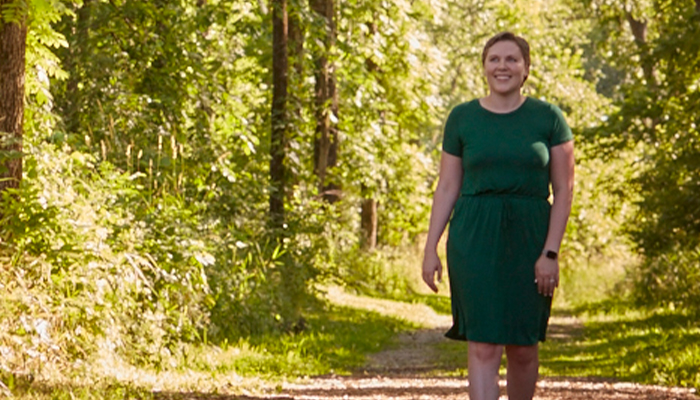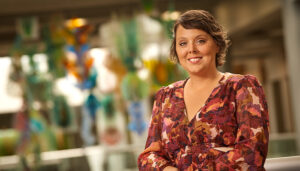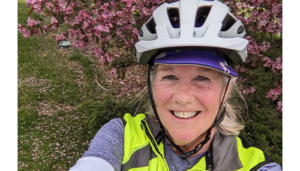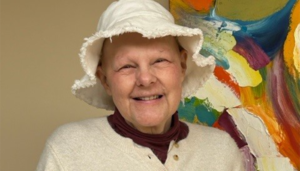In April 2021, Nicole Knoll of Cedar Rapids was doing her monthly breast self-check when she felt a hard spot, about the size of a dime.
“I immediately realized, this was a shift,” said Knoll. “It was unusual and different, and I just had this feeling. It was then that I called my doctor and scheduled a mammogram.”
At 35, Knoll was five years below the recommended age to begin annual screening mammograms. She was referred for a mammogram and ultrasound at St. Luke’s Breast and Bone Health.
“I was nervous about how things were going to work. They told me everything that was going to happen before it happened,” said Knoll of the team at Breast and Bone Health. “They kept me in the loop the whole time I was there. I just really, really appreciated that.”
It was determined the spot Knoll felt was a type of benign cyst. However, another questionable area was found during the ultrasound and Knoll was referred for a breast MRI, followed by a biopsy. This particular spot was a stage two lobular carcinoma, a spider web-shaped cancer that likely would have gone undetected had Knoll not been proactive and went to her doctor at the first sign of a change.
“We encourage women of any age to know how their breasts normally look and feel,” said Therese Michels, manager of St. Luke’s Breast and Bone Health. “Women should do self-breast exams at home, and if they do feel a lump or something concerning, they should reach out to their provider for further evaluation.”
Coordinated Care at the Nassif Community Cancer Center
During the diagnosis process, Knoll met Mona Cook, breast cancer care coordinator at the Nassif Community Cancer Center in Cedar Rapids. A care coordinator is a patient’s constant point of contact throughout the cancer journey, from diagnosis through treatment and beyond.
“Mona explained everything and answered my questions,” recalled Knoll. “She walked my husband and I through a breast cancer book and circled and highlighted things that pertained specifically to me. It was nice to have her as a resource throughout treatment to call or email anytime.”
Care coordinators also assess needs and set up referrals within the care team, including social workers, dietitians, exercise specialist and more. Cook connected Knoll with Matt Schmitz, cancer exercise specialist, and Barb Lorenz, oncology social worker.
“Matt gave me exercises to do during chemo that weren’t too extreme, but just enough to keep me moving,” shared Knoll. “Barb would stop by during chemo and ask how I was doing. It was really nice to know I could talk to her if anything difficult was going on.”
Knoll also used some of the integrative wellness services at the Community Cancer Center, including acupuncture and Reiki.
Don’t Dismiss Warning Signs
Knoll, who is now cancer free following her treatment, has a simple message for other women who read her story: Know your body.
“Know what’s not normal for you,” she said. “It’s easy to dismiss things. Don’t be afraid to go in and get checked out. Early diagnosis was key for me. I don’t like to think about what would have happened if I waited a year from now.”
Hear From Our Experts
In this episode, Therese Michels, manager of St. Luke’s Breast and Bone Health, returns to the podcast to discuss breast cancer screening recommendations, self-checks, the effect of COVID-19 shutdowns on breast cancer screening and more.
Get Your Annual Screening Mammogram
It’s recommended women start with a baseline mammogram between the ages of 35-40, then start annual screening mammograms at age 40, or sooner if there’s a family history of breast cancer. To schedule your mammogram, talk to your provider or call (319) 369-7216 to schedule your mammogram at one of St. Luke’s Breast and Bone Health’s three convenient locations. St. Luke’s Breast and Bone Health also offers walk-in mammograms Monday through Friday from 9 a.m. – 3 p.m., with a doctor’s order.
Facing a Cancer Diagnosis?
If you’ve been diagnosed with breast cancer, or any type of cancer, the Nassif Community Cancer is here for you. For more information on our extensive offering of support services, call (319) 558-4876 or visit communitycancercenter.org.







